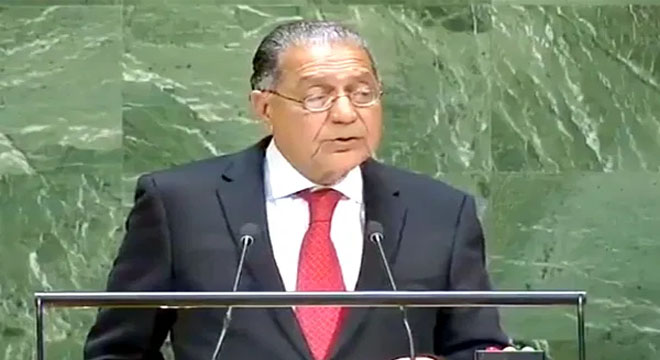UNITED NATIONS, Nov 04 (APP): The head of UN Economic and Social Council (ECOSOC), Ambassador Munir Akram of Pakistan, told the Security Council Tuesday that the present “unequal world order” was responsible for the member states’ failure in living up to the ideals of collective and cooperative security, and called for international cooperation to address the multiple challenges facing the world.
“The origins of many if not most of the plethora of conflicts and disputes on the Agenda of the Security Council can be traced to this unequal world order,” he said in his remarks via video-link during a Council debate on factors driving civil strife worldwide.
The root causes of conflicts “range from the internal struggles for scarce resources; external contests for precious natural resources, and interventions designed to suppress the struggle of peoples to reclaim their own political and economic destinies”, the ECOSOC chief said.
“It is a world where power prevails over principle, where the voices of the weak are suppressed and splintered, where the strong enjoy impunity for even gross violations of the Charter’s fundamental principles, Security Council resolutions and human rights; where the international cooperation enjoined by the Charter is increasingly absent.”
And now due to the coronavirus pandemic, the world economy is projected to contract by 5-10 per cent, depending on when the virus can be brought under control, Ambassador Akram said.
Noting that over a 100 million people will likely be pushed back into poverty, he flagged that “as usual”, the poorest countries and people “will suffer the most”.
In this regard, the ECOSOC chief highlighted Pakistan’s Prime Minister Imran Khan’s initiative in April for global debt relief for the developing countries and the launching by the UN Secretary-General, together with the Prime Ministers of Canada and Jamaica, the timely financing for development process, but said the response so far from those in a position to act has been “extremely modest and disappointing.”
Unless they receive financial assistance, Ambassador Akram said “many developing economies – with lost revenues and laden with unplayable debt – are likely to face economic collapse”, which “would spread chaos and further inflame regional conflicts and global tensions”.
The ECOSOC chief stressed the need for redressing the structural inequalities which have led the world into the current and previous financial and economic crises.
These reforms include an inclusive: equitable and transparent debt management mechanism, preferential banking regulations for developing countries; a fair international tax regime; an end to illicit financial flows from developing countries; mobilization of at least $2 trillion investment annually in sustainable infrastructure in developing countries, and preferential access for developing countries to the latest technologies, especially to bridge the digital divide.
“It is imperative that today, 75 years after the adoption of the UN Charter, we do not fail again to reflect its vision of collective economic security, He said, adding, “Never before in human history has the well-being and survival of humans depended so much on the actions and decisions of each other.”
Ambassador Akram also pointed to the rise in the phenomena of intolerance, hate speech, xenophobia and Islamophobia, saying the cycle of hate and violence could destabilize and divide societies and States.
“It can subvert the international cooperation that is essential to collectively address these multiple challenges. In this regard , he called for heeding the call for mutual respect issued by the High Representative for the UN Alliance of Civilizations, Miguel Moritanos.
“Finally,” he said, “we must also act to reverse the growing rivalries among the most powerful States and the new and deadly arms race which is underway.
“Unless we do so, regional tensions will rise and conflicts become more intractable. And, no one can rule out the danger of a global military conflict- precisely what the United Nations was created to prevent.
Instead of subscribing to new political blocs and alliances, the Members of the United Nations, and especially the members of the Security Council, must deploy all possible efforts to avoid a great power ‘collision’ and evolve mutually acceptable ways for revived cooperation on security, development, climate and other common challenges confronting humanity.”
The United Nations, he said, was the only universally acceptable instrument available to enable Member States to address the “contemporary drivers of conflict”.
“The UN system has the capacity, if mobilized, to support this epic endeavour for global peace and security, for equitable and inclusive development and for smooth and early transition to a sustainable global economic, social and political order.”
Follow the PNI Facebook page for the latest news and updates.









